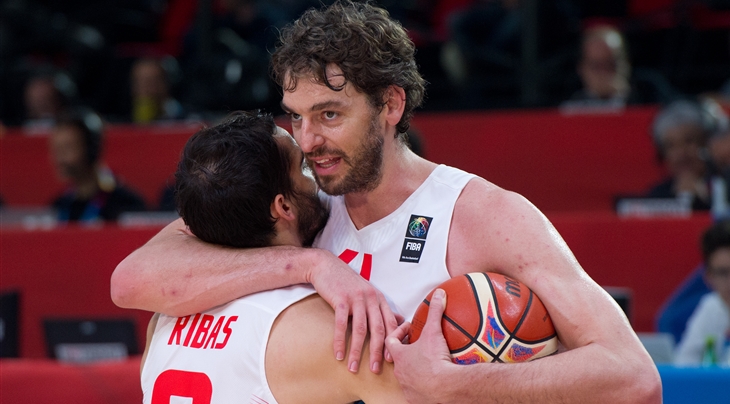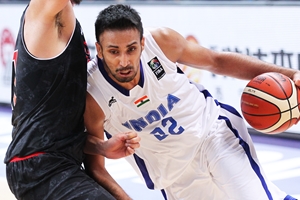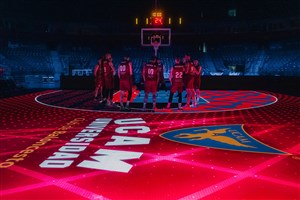
Could Catalunya election lead to downfall of Spanish basketball?
REGENSBURG (David Hein's Eye on the Future) - Just a week after Spain reclaimed their spot atop the continent by winning EuroBasket 2015, the political foundation may have been laid which could result in the downfall of the basketball superpower.
Sure, you might be wondering how politics fit into a column about international youth basketball. But give me a chance and you'll see the point.
Last weekend, the Spanish region of Catalunya went to the polls and voted in favour of what was billed as a proxy for independence in the wealthy northeastern part of the country. Separatist leaders narrowly won the Catalan elections, meaning the region's parliament has a majority of pro-independence-minded politicians.
The new leader, Artur Mas, will now work on a roadmap designed for Catalunya's full independence from Spain over the next 18 months.
Secession of Catalunya would have an enormous impact on the country as the region is Spain's industrial heartland and one of its wealthiest, accounting for nearly 19 percent of Spanish gross domestic product.
I know what you're thinking - "Enough of the politics. We get it. Catalunya is a big part of Spain. So what's the connection to basketball?"
Okay, stick with me, almost there.
Catalunya also has a huge presence in sports since it is home to the city of Barcelona. Of course, Barcelona is home to FC Barcelona, one of the biggest sports clubs in the world.
Ahead of the elections, Javier Tebas, the president of Spanish football's top flight La Liga, tweeted: "If Spain splits, La Liga splits. Let's hope to never arrive at something so absurd."
Si se rompe España, se rompe LaLiga. Esperemos no llegar nunca a ese absurdo.
— Javier Tebas Medrano (@Tebasjavier) 20. September 2015
According to at least one report, Tebas said that if Catalunya becomes independent from Spain, football clubs Barcelona and Espanyol would have to leave La Liga. And Spain's sports minister Miguel Cardenal reportedly said Barcelona would be unable to play in La Liga in the case of Catalunya's independence.
So, what is the case for Spanish basketball?
First off, three of the 18 Liga Endesa teams are based in Catalunya - Barcelona, Joventut and Manresa. Twenty-four of the 77 Spanish players in the league are from Catalunya and 12 of the teams in the league have at least one player of Catalan descent. And those players would all become foreigners if it got that far.
And let's be specific - it would be a very long road for Catalunya to get this far.
First, they would need to create a National Olympic Committee (NOC) recognised by the International Olympic Committee (IOC) and then a basketball federation before seeking membership with FIBA.
It will not be easy and could take years for Catalunya to get recognition by the international community as an independent state. It seems unlikely that Spain will throw an independent state recognition party right away, just like Serbia and Israel were slow to warm up to Kosovo and Palestine, respectively.
Unlike La Liga boss Tebas and sports minister Cardenal, there has been no comment from either the Spanish Basketball Federation (FEB) or the Spanish Liga Endesa about the result and possible consequences of the election - upon request from Eye on the Future.
Succession would send shockwaves through the Spanish basketball community - and the European game as well - as it would be inevitable that Barcelona, Joventut and Manresa all leave Liga Endesa.
And what about the players? Catalans are a proud group and many don't really feel part of Spain. If FIBA eventually does accept Catalunya, what would their national team look like?
To put it bluntly, Catalunya could quickly become a strong team in international competitions. Among the Spanish players who won EuroBasket 2015, Pau Gasol, Pau Ribas and Guillem Vives are of Catalan descent. Add to that Marc Gasol and Ricky Rubio.
And the Spanish youth national teams are also led by Catalunya natives. Marc Garcia, Yankuba Sima, Jose Nogues and Xavi Moix all played in the 2015 U20 European Championship. Garcia and Sima were joined by Ramon Vila and Nil Sabata at the 2015 FIBA U19 World Championship. Vila also played at the 2015 U18 European Championship with fellow Catalans Eric Martinez and Oscar Amo. And Raimon Carrasco, Sergi Martinez and Ignacio Rosa all played at the U16 European Championship this summer.
Catalunya also has supplied the Liga Endesa with eight head coaches from last season - Xavi Pascual (Barcelona), Joan Plaza (Unicaja), Pedro Martinez (Manresa), Carles Duran (Valencia), Salva Maldonado (Joventut), Joan Penarroya (Andorra), Alejandro Martinez (Teneriffe) and Jaume Ponsarnau (Gipuzcoa). That would seem to mean that Catalunya could be well-served to high level training for their players over the long haul.
But could Pau Gasol play for Catalunya? What about Rubio or Garcia or Rosa? Would they be eligible to change their national team colours?
The two statutes most often cited in nationality changes could apply. Players who have represented Spain before the age of 17 could then represent Catalunya if both federations agree. If they don't agree, the Secretary General of FIBA can decide. And players who have represented Spain after the age of 17 could represent Catalunya by special decision of FIBA's Secretary General if Catalunya is truly the player's homeland and if the change helps the development of basketball in Catalunya - as stated in the statutes.
All such decisions would be done on a case by case basis.
There is another way to resolve the issue. The FIBA Central Board could take a special decision nullifying the aforementioned regulations and granting players a specified period of time to elect which national team they wish to represent. This would be similar to the move taken when Yugoslavia was broken up into Bosnia and Herzegovina, The Former Yugoslav Republic of Macedonia (MKD), Croatia, Serbia and Montenegro and Slovenia. And the same was the case when Serbia and Montenegro was split into two independent countries.
Spain and Catalunya are still a long way from becoming two countries. But Spanish basketball may look at this past weekend as the start of its downfall.
David Hein
FIBA
FIBA's columnists write on a wide range of topics relating to basketball that are of interest to them. The opinions they express are their own and in no way reflect those of FIBA.
FIBA takes no responsibility and gives no guarantees, warranties or representations, implied or otherwise, for the content or accuracy of the content and opinion expressed in the above article.


















